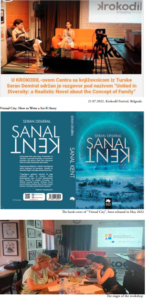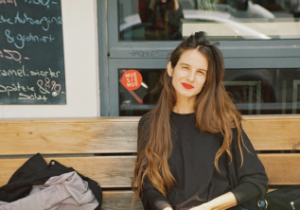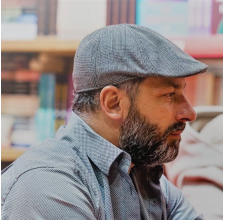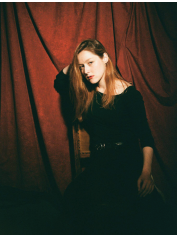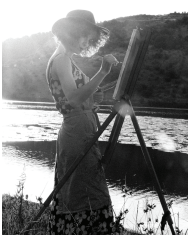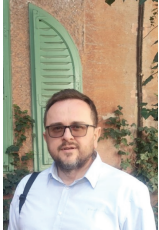Seran Demiral, a multifaceted intellectual, is an author of children’s literature and sci-fi writer from Istanbul, Turkey. She started to write and publish novels since she was a teenager. After she graduated from architecture, she studied sociology and also tried to adapt social issues to her fiction writing. Vice versa, she carried her experience with children to her academic works. Afterwards she studied the subjectivity of adolescents through their interaction with digital technologies for her PhD dissertation. Nowadays, Seran Demiral is continuing with her literary work, especially realistic fiction and theatre plays.
- I have been writing since childhood, and each time and place I have experienced has had a significant impact on my creativity. I have almost no certain routines to write like “working during the day” or “preferring silence to study”, et cetera. Instead, I change my inspiration sources in the main according to the content I have paid attention to. Because I write in many different genres, and in addition to fiction, I also write some essays and articles for my academic work, I have diverse habits for writing. However, the intersectional point for my different writing experiences is always societal and cultural surroundings. Even if it is a science-fiction novel around a universal topic, my cultural background and the social environments influence the characters I make up.I also studied social sciences after I had graduated from architecture and had a PhD degree in sociology since I have considered that such social issues would give me a deep motivation to create more sensible and realistic worlds for various genres. So, my creative activity generally depends on my social space experiences and cultural surroundings.
- I was born and bred in Istanbul, and I can describe myself as a city person throughout my life. My artistic and architectural interests have always conducted my personality. As a teenager, I spent my everyday life among the bookstores, cafes and cinemas on the streets of Kadıköy and the galleries, studios and theatres in Beyoğlu, where the heart of alternative cultures for decades. I witnessed many fascinating artworks and music and attended many cultural activities as a very young individual in this big city. As long as I grew up, I discovered different parts of Turkey, and when I started travelling to other places where I could also encounter nature, I found out about its effects on my creative production. Besides, other countries where I got inspiration from various cultures and diversity influenced me as a writer. Encountering many people of different ages, gender, ethnicities, nations, and so on, I have witnessed the demographic change in my city and country and got influenced by each transformation. On the other hand, my mobility among different cities and countries and experiencing small towns, their nature, and other species also change my trajectory to write about various topics nowadays.
- During the first two weeks of my stay, I only focused on completing my recent novel, “Kırkyama” (Patchwork). Its plot is about the concept of family and how being grown within different family forms has sharp but changeable impacts on a person’s life. While working on the novel, my Belgrade stay showed many similarities between Turkish and Balkan people, from culture to language, from everyday life to friendship forms.I had many chances to observe people, meet people and see the places in the middle of urban renewal projects. From the Watergate to Luka Beograd, the city’s transformation was also quite interesting to me for understanding and interpreting how the economic and social changes reflect the physical structure and appearance. On the one hand, the Yugoslavian heritage of, especially Belgrade but the Balkan region in general, still seems strong in the urban fabric, and social impacts are also visible for the older generations as far as I observe. On the other hand, considering the progress of becoming a part of the globalized world and the economic networks, the city reminds me of a decades-ago version of Istanbul.
While considering the similarities between my city Istanbul and Belgrade as the host city during the residency, I have shaped my final project. In addition to my essential work, which I completed its first draft during the first half of my stay in Belgrade, I intended to write a theatre play and planned all its steps according to my lived experiences and observations in Belgrade. Before going there, I only had known that the drama would take place in a classroom environment, and there would be brainstorming about a sort of transformation of a space, community, only the classroom, or the environment, et cetera. As long as I was chatting with people and travelling (I also visited Skopje and had a couple of days in Montenegro) in the Balkan region, I decided to write about a specific workshop where the characters would participate, from different countries of the world, especially this region. And now, I would love to read, see, hear, and watch -if possible- my play, which directly touches on diversity issues by reminding the “united” with a few brainstorming questions in other languages. It is debatable for sure, but while writing this theatre play, I tried to disclose that we, as all human beings have many biases toward each other, no matter whether we try to behave politically correct or preserve our fair understanding of each other. However, the intersections are always more apparent and just here to discover.
- First of all, writing is the best way for me to express myself. I used to be interested in music and photography when I was a child. Then, I also worked as an architect for a while, in which I tried to draw and produce spaces. I always have influences and inspirations from images and sound in addition to words or ideas. Yet, my essential tool to describe something is telling them through words. I always try different ways of expression, and as you see, I have recently worked on a theatre play, which is a brand-new genre to me. In the end, I have issues to face and stories to tell, so I write. I can also define myself as a storyteller; besides, as a researcher, I study ethnography and write (graph) about/of/for/with human beings (ethno).
